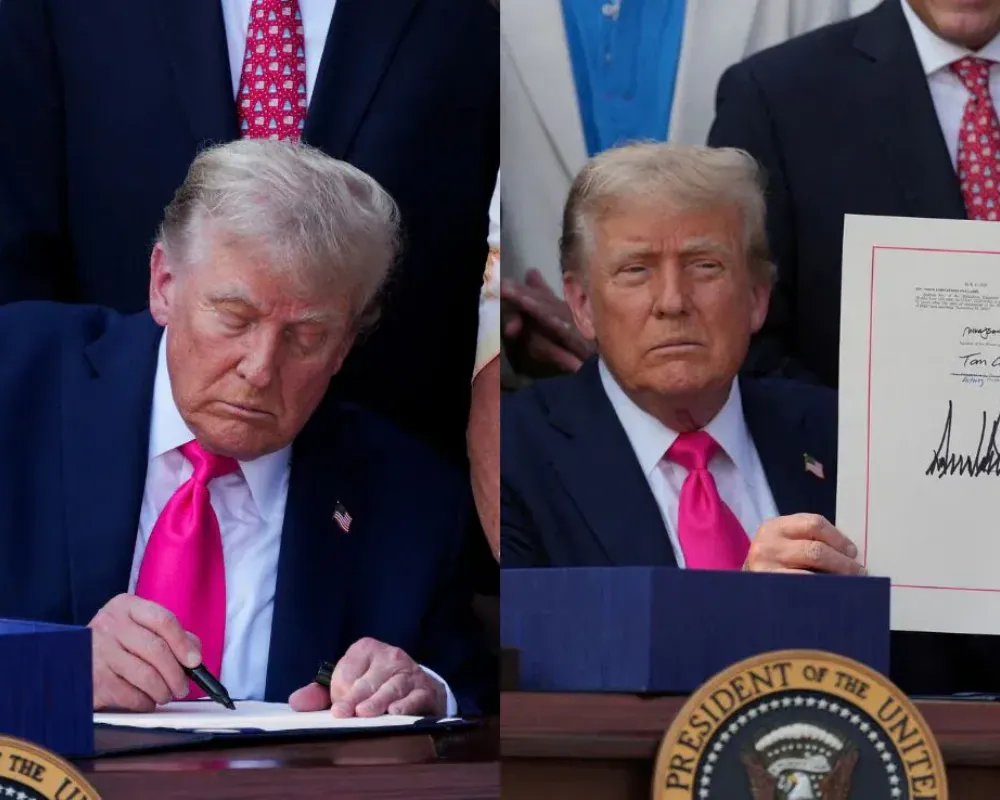President Donald Trump signed the "One Big Beautiful Bill" (OBBB) into law on July 4, 2025, following its narrow passage in the U.S. Congress. This nearly 900-page budget reconciliation bill represents a sweeping legislative victory for the Trump administration, enacting significant changes across various sectors of the American economy and federal policy.
Here's a summary of its key provisions:
1. Tax Reforms & Incentives:
- Permanent Tax Cuts: Makes permanent many of the individual income tax rates and brackets from the 2017 Tax Cuts and Jobs Act (TCJA) that were set to expire.
- SALT Cap Increase: Temporarily raises the cap on the State and Local Tax (SALT) deduction to $40,000 for taxpayers earning less than $500,000, from the previous $10,000. This increase is set to revert to $10,000 after 2029.
- No Tax on Tips & Overtime: Creates new tax deductions, effectively making most tips (up to $25,000 annually) and overtime pay (up to $12,500 annually) non-taxable at the federal level for workers earning below certain thresholds. These provisions are temporary, expiring in 2028.
- Child Tax Credit Increase: Increases the maximum Child Tax Credit from $2,000 to $2,200 per child and indexes it to inflation.
- Senior Tax Deduction: Offers a temporary tax deduction of up to $6,000 for seniors, which phases out for higher earners. This is expected to result in 88% of seniors paying no tax on their Social Security income.
- Business Tax Relief: Permanently extends the 20% deduction for pass-through business income and restores 100% immediate expensing (bonus depreciation) for qualified business property and R&D expenses.
- "Trump Accounts": Establishes a new savings vehicle where the U.S. government deposits $1,000 upon the birth of a child (born between 2025-2028), with parents able to contribute up to $5,000 annually, growing tax-deferred for higher education, job training, or a home down payment.
- Car Loan Interest Deduction: Allows buyers to deduct up to $10,000 per year in auto loan interest for U.S.-assembled cars purchased between 2025-2028, with phase-outs for higher incomes.
- College Endowment Tax: Increases taxes on investment income from college endowments for wealthier institutions.
2. Immigration & Border Security:
- Massive Funding: Allocates substantial funding (reportedly $350 billion) for border enforcement and deportations.
- Border Wall & Detention: Includes funds for finishing the US-Mexico border wall and expanding migrant detention facility beds (reportedly to 100,000).
- Increased Staffing: Funds the hiring of 10,000 new Immigration and Customs Enforcement (ICE) officers and boosts Border Patrol staffing.
- Remittance Tax: Imposes a new 1% excise tax on certain outbound international cash remittance transfers from the U.S.
- Asylum Fees: Introduces a $100 fee for asylum seekers.
3. Social Safety Nets & Healthcare:
- Medicaid Cuts: Imposes new 80-hour-per-month work requirements for many able-bodied adults (ages 19-64) without dependents to maintain Medicaid coverage. It also increases state responsibility for some costs and requires more frequent eligibility checks, potentially leading to millions losing coverage.
- SNAP Cuts: Expands work requirements for Supplemental Nutrition Assistance Program (SNAP) benefits (food stamps) to include adults up to age 64 and shifts more cost-sharing responsibility to states.
- Rural Health Funding: Establishes a $50 billion "Rural Health Transformation Program" over five years (2026-2030) to improve healthcare access and outcomes in rural areas.
- Medicare Drug Negotiation: Reverses aspects of Medicare's drug price negotiation program, potentially increasing costs for consumers.
4. Energy & Environment:
- Rollback of Green Energy Credits: Accelerates the phase-out or outright repeals many clean energy tax credits and programs established under the previous administration's Inflation Reduction Act (IRA), including those for electric vehicles and residential energy products.
- Fossil Fuel Promotion: Repeals the methane emissions tax and supports unlocking oil and gas development on federal lands.
5. Defense & National Security:
- Increased Defense Spending: Provides significant new defense spending (reportedly $150 billion).
- Golden Dome System: Allocates $25 billion for the development of the "Golden Dome" missile defense system, envisioned as similar to Israel's Iron Dome.
6. Education:
- Federal Private School Choice: Establishes the first nationwide, federally funded private school choice initiative, allowing eligible families to access scholarships for private and home education through a tax credit model. This program is set to be fully rolled out in 2027.
7. Fiscal Implications:
- Debt Ceiling Increase: Raises the U.S. debt ceiling by $5 trillion.
- Projected Deficit Impact: The bill is projected by the Congressional Budget Office (CBO) to increase the federal deficit by nearly $3.3 trillion over the next decade (2025-2034).
The "One Big Beautiful Bill" represents a bold and comprehensive legislative agenda, reflecting President Trump's core policy priorities from his election campaign. Its passage is expected to have far-reaching effects on the U.S. economy, social programs, and national security for years to come.
 Sseema Giill
Sseema Giill







 Trending Now! in last 24hrs
Trending Now! in last 24hrs